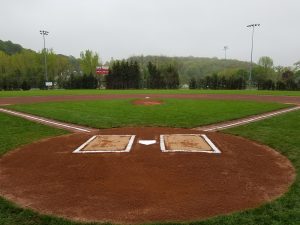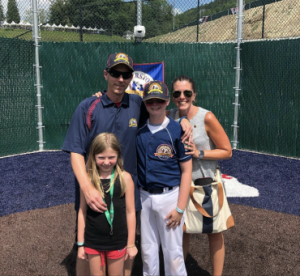Coaching Amidst Crisis — At Home Edition

By Michael Hopkins
As I sat with my son, Brady, on his 13th birthday watching an old Yankees game, I couldn’t help but consider what was running through his mind.
Instead of going to Yankee Stadium during spring break or preparing for an April weekend baseball tournament of his own, Brady was left watching the rebroadcast of an old game – not even in high-def, to add insult to injury.
“Not having baseball,” Brady replied when asked what he missed most during the COVID-19 pandemic.
I then turned to Brady’s nine-year-old sister, who participates in various sports but is considerably less competitive.
“I would be very sad,” Riley said when told the spring softball season might be canceled completely. “But, if it’s played in the summer, I still get to play and have fun with my teammates.”
While the pandemic rages across the world, causing death, fear and financial devastation, I begin to think of the one constant that millions of children may miss out on in 2020: youth sports.
Sure, it’s disappointing that Major League Baseball missed its Opening Day, while the NBA, the NHL and other leagues suspended their seasons. Yet those sports will return and thrive when they do, and most players won’t skip a beat.
But think about a 12-year-old robbed of a last season in Little League. Consider a four-year-old unable to play organized soccer for the first time. Ponder a high school senior getting that final spring season stolen by an invisible virus. Childhood dreams lost forever.

Let’s also not forget, while it can be competitive, youth sports are not about winning. Youth sports are about memories, teammates, exercise, sportsmanship, commitment to learning something new, the feeling of accomplishment and, most importantly, fun.
While kids may be unable to chant their team name or play for trophies, youth living through this uncertain moment can still enjoy sports, from the safety of home.
All they need? A parent or older sibling serving as a volunteer coach and a little space. They can create some memories of their own, while providing children with a little piece of the magic of youth sports.
Think about counting how many times you can toss a ball back and forth without dropping it. It can create a feeling of wins, losses and accomplishments as together you try to set new records of clean catches in a row. This simple activity creates teamwork between the participants while developing hand-eye coordination. You also might be surprised who drops the ball more often!
You don’t need to spend hours online searching for the proper technique. While resources exist to learn and teach the proper athletic forms, simply playing can create a memorable experience this spring.
An imaginative game of hitting a balloon with a stick, ruler or other instrument can be fun, while developing simple timing for sports that require striking a ball, such as softball, baseball, tennis and field hockey.
While balloon batting can be fun at any age, as youth athletes get older, they may want more specific and demanding training.
Athletes who are 11 and 12 have typically participated in many practices in previous seasons and will know some drills. Temporary coaches should listen to their young athletes and help them complete the various activities from previous seasons, turning them into games when possible.
Drills such as figure 8 dribbling with a soccer ball or basketball are easy to set up and complete. Time your young athlete completing the course, with each faster time an earned win.
As young athletes become teenagers, they may have developed their own routines. However, you can still serve a purpose, helping push them during their workouts or even joining them.
As older athletes often jog or run to improve their cardio, challenges can be created for the entire family. Each family member can run a portion of a 5K, with the total combined time being the score to beat. Complete the same run the next weekend to beat that time and “win.”
This pandemic will end and youth sports will return with smiling faces and cheering parents. In the meantime, all of us can work to create a special season for our young athletes, one creative toss, pass, run and challenge at a time.
A volunteer coach for nine years, Michael Hopkins, his wife, Nancy, and their children, Brady and Riley, live in Bedford Corners. Michael is a volunteer coach with Katonah-Lewisboro Bedford Softball and St. Patrick’s CYO Basketball programs, while also serving on the Bedford Hills/Katonah Little League’s board of directors.

Examiner Media – Keeping you informed with professionally-reported local news, features, and sports coverage.
